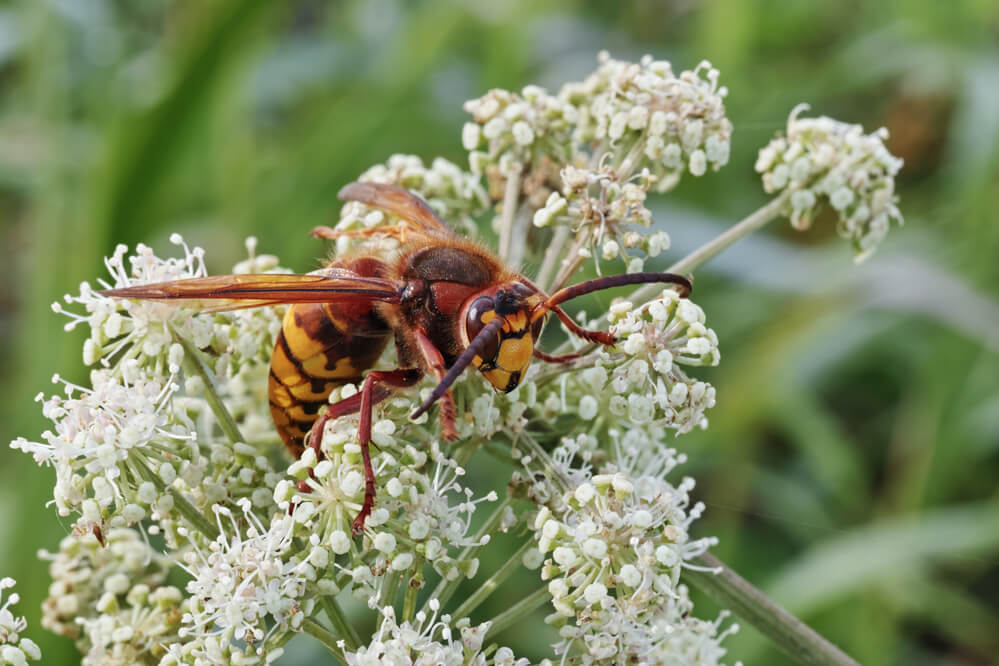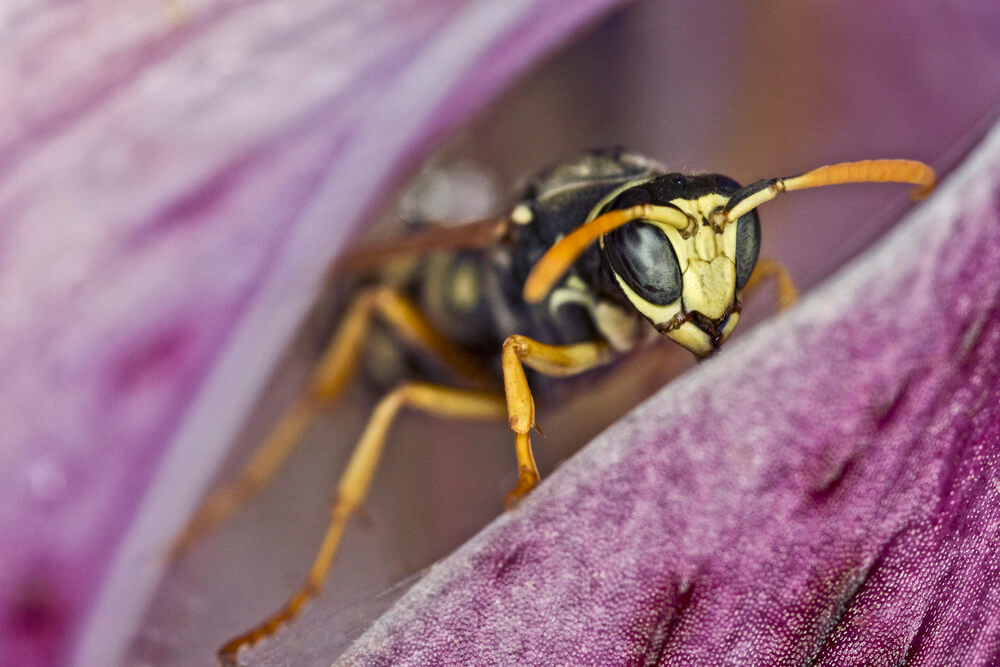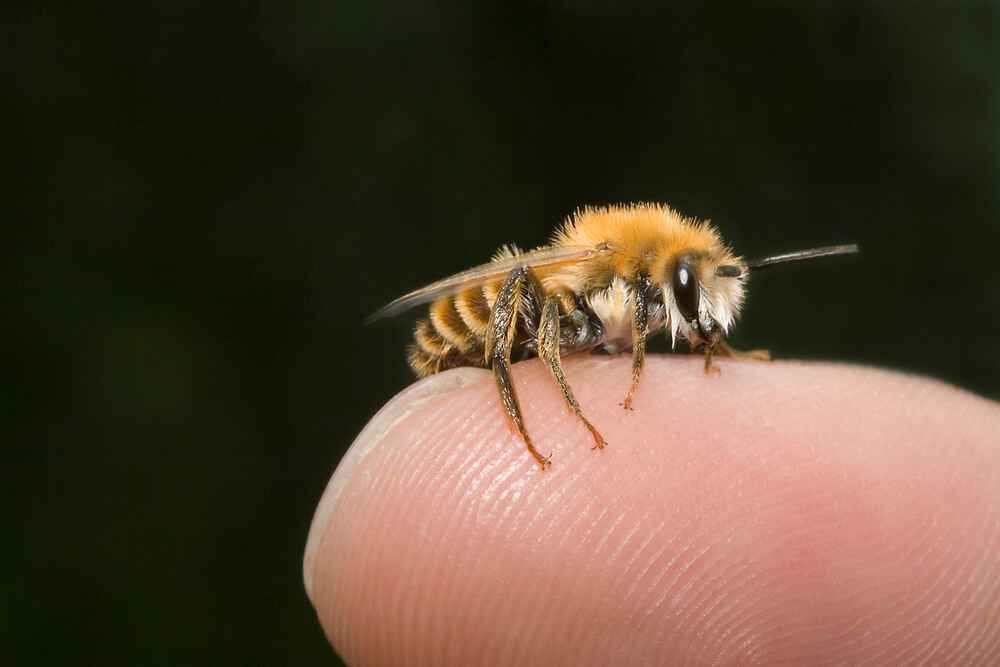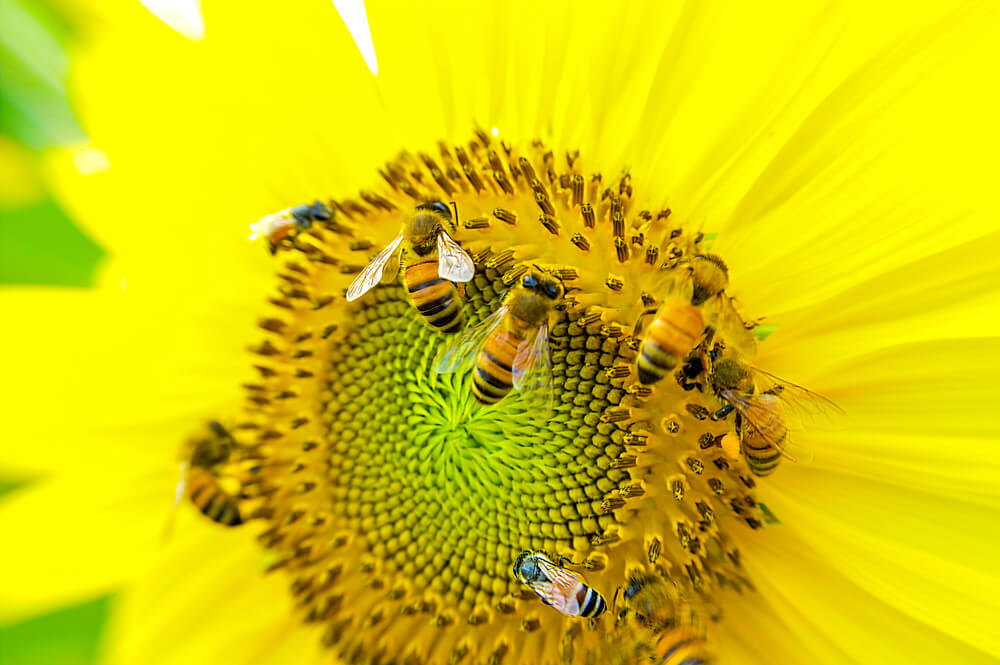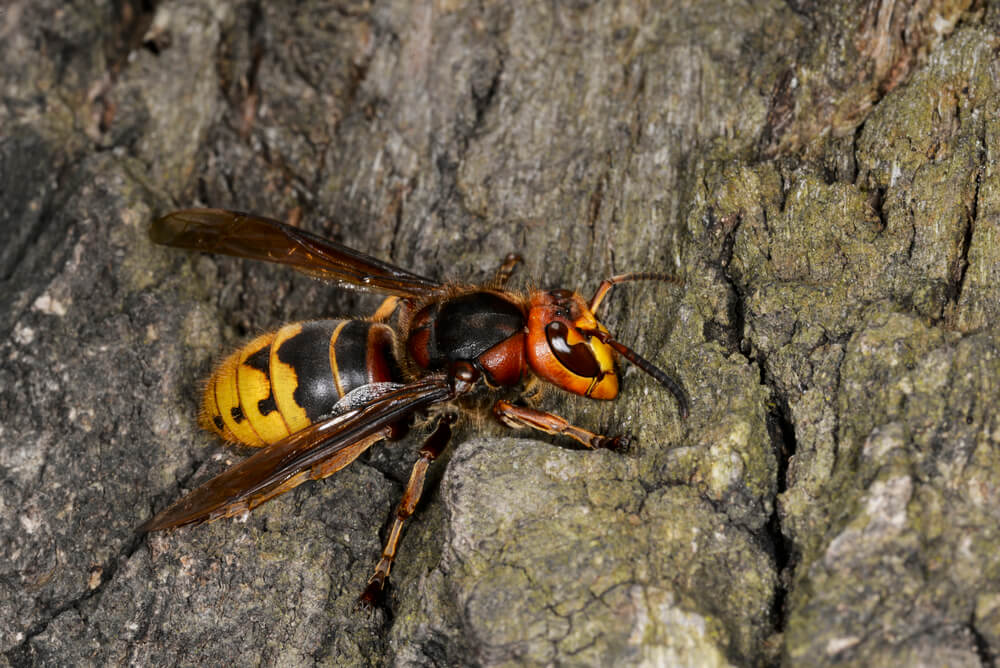Table of Contents:
Do Hornets Make Honey?
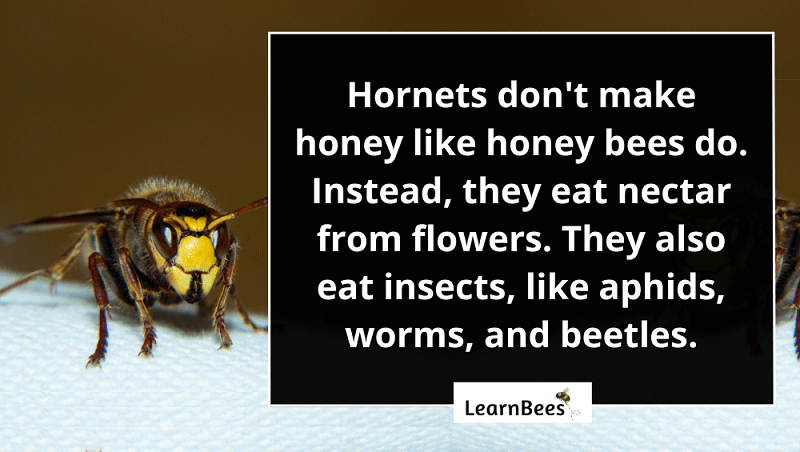
Hornets don’t make honey.
Honey is a sweet sugary substance produced by honey bees, bumble bees, honey wasps, and a few other types of insects.
More specifically?
Honey-producing insects make honey from nectar. Plants produce nectar as a reward that encourages pollinators to visit their blossoms.
Like honey bees, hornets eat nectar to obtain carbohydrates. In turn, nectar gives them the energy to nest, fly, and defend themselves.
But unlike bees:
Hornets are omnivorous insects that also feast on other bugs for protein.
They eat crickets, caterpillars, aphids, flies, earwigs, and many other insects. And while hornets get a terrible reputation for being defensive, their bug-eating diets earn them kudos from gardeners and farmers.
Why?
Because many of the insects hornets eat, including aphids and earworms, are common pests that destroy crops. So without hornets, many of our food crops would be invaded by pests.
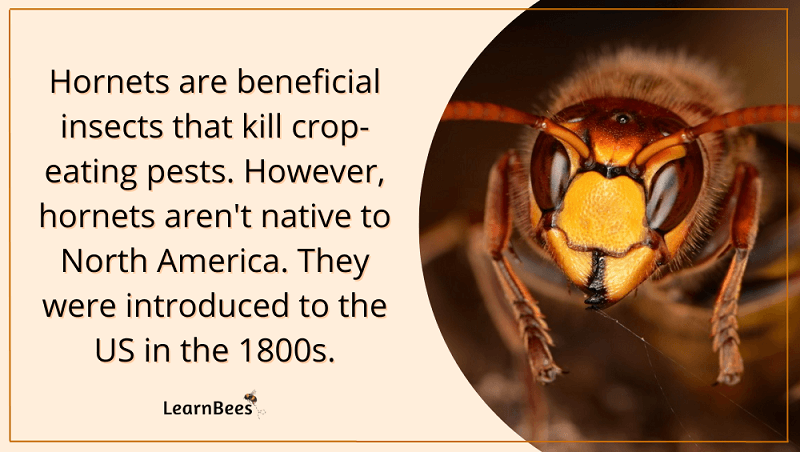
So make no mistake:
Hornets are beneficial insects in the countries they’re native to.
They play a crucial part in the ecosystem by helping to keep habitats balanced. Sure, hornets don’t pollinate on nearly the same level as bees do.
But their role in the ecosystem shouldn’t be reduced.
It’s worth saying that hornets and bees are closely related. In fact, many scientists consider them to be “cousins” in the insect world.
However, bees tend to be more passive-natured. For example, honey bees are gentle creatures that don’t go out of their way to sting people.
But this is where the irony enters the picture.
You’d expect honey bees to be aggressive because of all the honey-loving predators that target their hives. Bears, rodents, and honey badgers are just a few examples of animals that love honey.
But here’s the interesting part:
Honey bees are usually only defensive if an animal or person begins poking around their hive. Otherwise, they avoid trouble and stick to themselves.
In contrast:
Wasps tend to be much more defensive. Yellowjackets, for example, are quicker to sting if they feel like they’re being threatened.
Do Hornets Make Honeycomb?
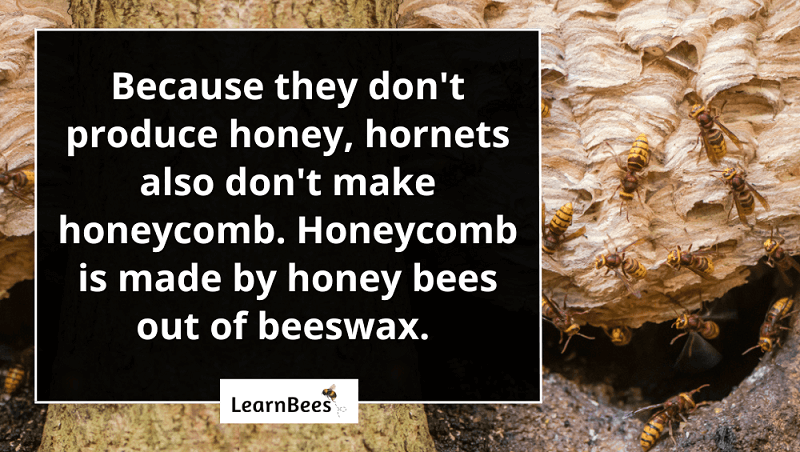
Hornets don’t make honeycombs like honey bees do.
Honey bees make honeycombs to store honey. The comb is made of beeswax, and the bees secrete it from eight wax-producing glands on their abdomen. Honey bees also produce comb to raise bee larvae. This is called “brood comb.”
Hornets don’t have wax glands, so they cannot make beeswax.
With that in mind:
Hornets build nests made of hundreds of hexagonal cells.
Honeycomb also comprises of hexagonal cells, so hornet and honey bee nests share that in common.
But, hornets build their nests by chewing wood from trees or shrubs. They scrape tiny bits of wood using their mouth, then mix the wood shavings with their saliva to form a pulp. This creates a paper-like consistency that the hornets form into hexagons.
Once dried, hornet nests can be the size of a basketball with a grayish color.
Do Hornets Steal Honey From Honey Bees?
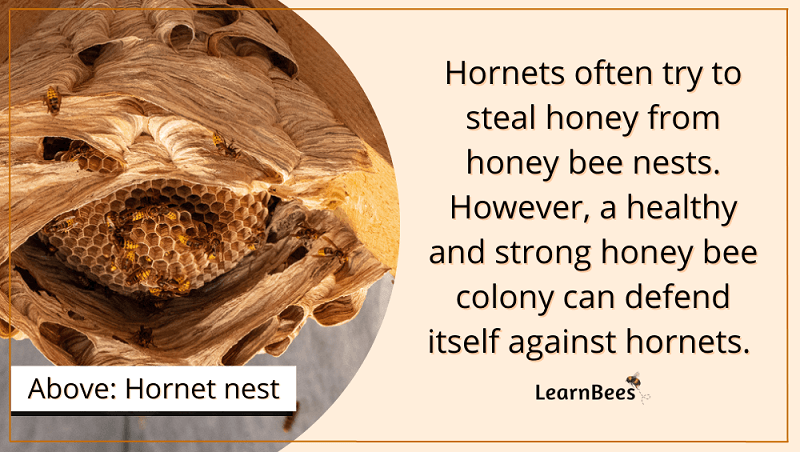
Hornets and other wasps often try to steal honey from honey bees. Unfortunately, an aggressive and powerful hornet colony can kill thousands of honey bees.
Hornets go after honey bee colonies for two reasons:
- To take their honey so they can eat it themselves
- To take honey bee larvae to feed young hornets
If only a small number of hornets attack the honey bee nest, then the bees can typically fight them off. The bees will either sting the hornets to death, form a ball around them to suffocate them, or chase them away.
Keep in mind:
Honey bee hives can be huge nests containing over 50,000 honey bees.
However, the problem happens when hornets attack small or weak honey bee colonies. If there are too many entrances, gaps, or cracks in the honey bee hive, then the hornets have a greater chance of getting in.
In this case, hornets can quickly overwhelm small or weak beehives.
Once the hornets break in, they can wipe out the entire honey bee population in a matter of hours.
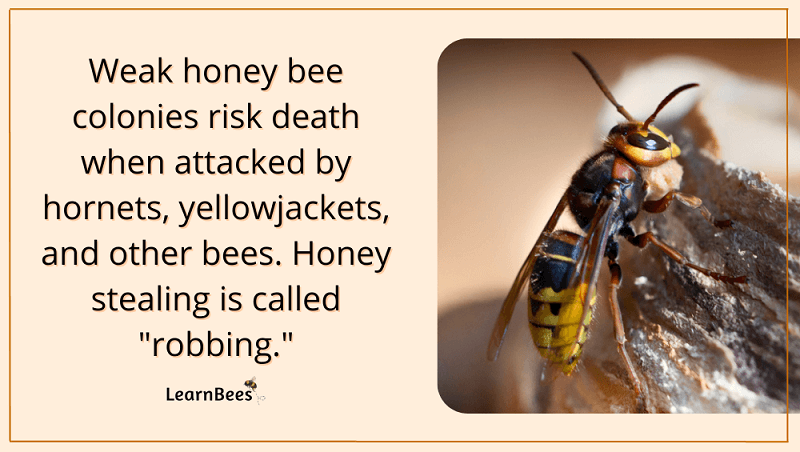
Hornets will eat the bee eggs, larvae, pupae, and honey – whatever they can get their hands on. They’re tenacious and won’t back down until the hive is empty.
How do beekeepers stop this?
Well, it’s essential to remember that no prevention method is foolproof.
With that in mind, there are tricks beekeepers can use to stop hornet attacks. For starters, beekeepers can decrease the hive’s entrance so the honey bees can easily guard it.
When the hive entrance is too large, or there is more than one entrance, then the honey bees can struggle to keep hornets out of their nests.
Additionally, beekeepers should maintain a clean apiary that doesn’t entice hornets and other wasps to hang around. Hornets crave sugary-sweet foods. So leaving sugar water or honey around the apiary can draw their attention.
The bottom line?
The dynamic between hornets and honey bees is fascinating.
Sometimes, you’ll spot them pollinating beside each other on flowers. Other times, hornets kill honey bees to steal their larvae and honey.
It’s a puzzling planet we live on, to say the least.
FAQs on “Do Hornets Make Honey?”
- Do hornets make wax?
- Do hornets make honey in the ground?
- Do hornets eat honey?
- Do hornets eat honeycombs?
- Why don’t hornets make honeycomb?
- Why don’t hornets make honey?
- Why do hornets steal honey from bees?
Do hornets make wax?
No, hornets don’t make wax because they don’t have wax glands like honey bees. Hornets rely on chewed wood and saliva to build their nests.
—> Go back to the FAQs on “Do Hornets Make Honey?”
More to Explore:
- Do Hornets Pollinate?
- What’s the Difference Between Wasps, Hornets, and Bees?
- Wasp Nest vs. Bee Nest: Which One Is It?
Do hornets make honey in the ground?
No, hornets do not make honey in the ground because they cannot produce it.
Honey is made from the sweet liquid called nectar, which some flowers produce. Honey bees collect nectar from flowers with their long tongues. They mix the nectar with special enzymes in saliva, then store it inside honeycombs for later. Honey is the food that honey bees rely on during the winter when flowers are unavailable.
Like honey bees, hornets nest above ground in social colonies with hundreds of other hornets.
Unlike honey bees, most of the hornet colony will die before winter arrives, leaving only the queen hornet behind. The female hornet mates with males in the late summer and fall to get enough fertilized eggs.
The queen hornet will hibernate until spring arrives. Then she will reproduce and start her own colony.
This is why hornets don’t need to make honey because they aren’t active during the cold months, like honey bees. Honey bees stay together in their hive during the winter. They keep each other warm by vibrating their wings and staying close.
Honey bees rely on the honey they make during the spring, summer, and fall to eat during the winter.
Contrastly, hornet queens hibernate in safe areas, such as under rocks or inside hollow tree stumps. Sometimes they’ll use other structures to hibernate in, like inside sheds or cracks found on the exterior of houses.
When a hornet queen is hibernating, her metabolism slows down, and she’s not working or eating.
—> Go back to the FAQs on “Do Hornets Make Honey?”
More to Explore:
Do hornets eat honey?
Yes, hornets do eat honey. Unfortunately, hornets are known to steal honey from bee hives.
Hornets are attracted to sugary smells. They’ll fly around in search of honey or sweet substances. When they find a honey bee nest, they’ll enter the hive and look for honey.
This is especially common when there is a lack of nectar from flowers in the environment, otherwise known as a “nectar dearth.”
Most people think nectar dearths only happen in the winter, but they can also occur during hot and dry spells between spring and fall.
For example, summer droughts are common in arid places like California, Arizona, and Nevada. Flowers can wilt, and plants can die if they don’t get enough water during these periods of drought. This is why drought-tolerant plants are beneficial for dry and hot climates.
Not only can it help the bees, but it can also help ladybugs, butterflies, and other vital pollinators. By providing them with a source of food and shelter, we can make a big difference in their populations – and ultimately in the health of our ecosystems.
It’s also important to keep in mind:
Not all plants make nectar.
Plus, flowers that make nectar can have their production reduced by unfortunate growing circumstances such as high temperatures and low rainfall.
For a drought-tolerant and pollinator-attracting garden, stick to native plants. Not only will the local pollinators be able to benefit from them, but they’re also already adapted to your climate. Consequently, you won’t have to stress about whether they’ll survive.
In conclusion, avoid using harmful pesticides and herbicides in your garden. They can poison bees, ladybugs, butterflies, and other useful insects.
So, in short, yes, hornets do eat honey. Though it’s critical to remember that they mainly live off of nectar from different types of plants.
When nectar sources are scarce, hornets rob honey from bees more often.
—> Go back to the FAQs on “Do Hornets Make Honey?”
More to Explore:
- Do Yellowjackets Sting or Bite?
- Do Wasps Make Honey?
- How Do You Get Rid of a Yellowjacket Ground Nest?
Do hornets eat honeycombs?
Hornets don’t eat the honeycomb itself, just the honey inside it.
It is easy to get confused, but as mentioned before, honeycombs are constructed from beeswax. This substance is secreted through eight wax-producing glands on each honeybee’s abdomen. Honeycomb does not act as a food source for bees or wasps.
Unfortunately, the delicate honeycomb is often disrupted when robbers break into a hive to take honey and larvae.
Many hardworking honey bees are killed yearly by robbers, such as hornets or wasps. If you’re a beekeeper, protecting your hives from these pests is crucial. Otherwise, the colony could be wiped out entirely.
—> Go back to the FAQs on “Do Hornets Make Honey?”
More to Explore:
Why don’t hornets make honeycomb?
Honey bees have specific abdominal glands that produce wax, which hornets don’t have. Therefore, hornets can’t make honeycombs like honey bees can.
Although hornets may share some similar features as honey bees, they have different habits when it comes to living, eating, and nesting.
Both species are essential pollinators in the ecosystem and have social colonies. They also share similarities in their diets, such as preferring nectar and other sweet substances.
But hornets cannot produce wax, and as a result, they cannot make honeycomb.
—> Go back to the FAQs on “Do Hornets Make Honey?”
More to Explore:
Why don’t hornets make honey?
Hornets don’t need to make honey because most of the hornet colony dies before winter arrives. Only the queen hornet survives by hibernating; during that time, the queen is neither eating nor working.
Even though hornets eat honey, they don’t actually produce their own honey. Instead, they steal it from honey bee hives.
—> Go back to the FAQs on “Do Hornets Make Honey?”
More to Explore:
Why do hornets steal honey from bees?
When nectar sources are lacking, hornets will steal honey from bees. In these instances, they may break into bee hives to eat the stored honey and larvae.
It can have devastating consequences when yellowjackets and hornets rob bees, especially during a nectar dearth. These insects can destroy an entire hive in just a few hours by robbing the bees of honey and larvae.
Beekeepers take measures to prevent yellowjackets, hornets, and other wasps from entering their hives.
